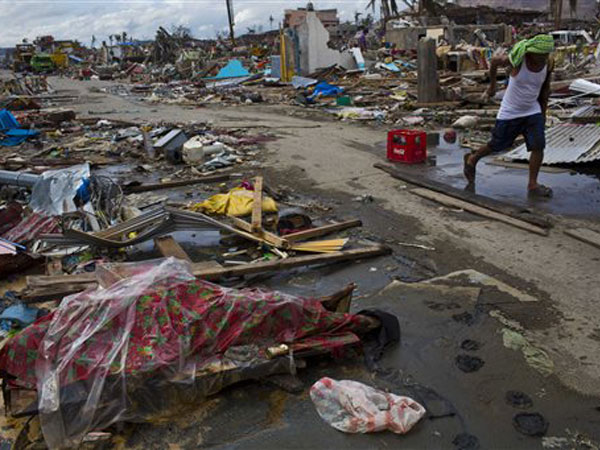Cash-for-work scheme to help lift morale of typhoon victims
TACLOBAN CITY—Tens of thousands of desperately needed jobs are being created for survivors of Supertyphoon “Yolanda” by paying them to clear mountains of waste from ruined cities and farms.
UN agencies are spearheading the “cash for work” programs, which they hope will provide a triple-boost to communities destroyed by the supertyphoon, with lifting morale as vital as cleaning up and helping economies.
“This is not only important to help normalize the economy, but working gives a sense of dignity back in their lives,” said Tim Walsh, leader of the United Nations Development Programme (UNDP) team deployed to the worst-hit city of Tacloban and nearby areas.
200,000 jobs
The United Nations, working in partnership with the Philippine government, is hoping to create at least 200,000 jobs that could last for up to three years.
Walsh said their immediate task was to help clear the mountains of rotting garbage and debris, which is necessary to allow for faster transport of aid and delivery of other essential services.
As much of the material as possible will then be recycled.
Yolanda (international name: Haiyan), the most powerful typhoon ever recorded to have hit land, slashed across mostly the Visayas, killing more than 5,500 people and destroying or damaging the homes of four million.
Giant storm surges generated by the typhoon were more destructive than the winds, powering more than one kilometer inland on the islands of Leyte and Samar.
Dozens of coastal communities were obliterated, as the water crushed homes, fishing boats, vehicles, electrical posts and virtually every other piece of urban infrastructure.
Vast stretches of coastal rice farms were also contaminated and their irrigation channels destroyed, while the wind tore down millions of coconut trees that were a mainstay of the already extremely poor islands.
Similar to Aceh
Leslie Wright, a spokesperson for the UNDP team in Tacloban, said the cash-for-work program was similar to an effort in Indonesia’s Aceh region after one of the world’s most devastating tsunamis killed 170,000 people there in 2004.
“Some of the things we are seeing that are comparable to Aceh include the consistency of the debris—like the wood, the metal, rock and concrete, aside from the organic waste and the bodies still being extracted every day,” she said.
The volunteer workers are being paid between P250 and P500 a day to haul the debris to selected collection points, where trucks pick them up to be taken to temporary landfills outside the city for sorting.
Rebuilding schools
“The wood and timber we can refurbish, which we did in Aceh, where we used them to rebuild schools and houses, while the concrete we used for roads,” Wright said.
“We reused as much material as we could.”
The UN’s Food and Agriculture Organization is looking to set up a similar cash-for-work program in agricultural areas, paying farmers and others in the community to clear their land and desilt irrigation canals.
It said its program will cover more than 150,000 hectares and 80 kilometers of communal irrigation canals that need to be cleaned, warning upcoming harvests are at dire risk without quick action.
However, the FAO needs more money to get the program into top gear, and this week launched an international appeal for $11 million.
Sense of direction
John Lim, the Tacloban city administrator, said having people help in the clearing and rebuilding process was an important way for them to deal with the trauma of the disaster.
“We want to give them a sense of direction, to try and get them back on their feet by giving them an incentive in helping us clean the community,” Lim said.
And for workers such as Rowena Cayuda, a mother of five, there is indeed relief that they no longer have to depend solely on aid to survive, as well as a touch of pride.
“We are doing decent work and we are helping the community,” Cayuda said as she pulled at a rusted metal sheet roofs in Tacloban.
Cayuda said she and her mechanic husband, who lost his job after the auto shop he worked for was destroyed, had initially thought of abandoning the city, but they didn’t have any money to travel.
“Now that we have a little, we think we can start a small business, maybe a store and not leave at all,” Cayuda said.















